#mythos the historian
Text
Do you all have anything for legends in the series. Now I don't mean Legends as in Darkstalker Legends I mean in book legends. Like stories dragons tell each other that have persisted throughout the years.
Little fairy tales parents tell their kids, bed time stories things like that.
#I am in desperate need for wof worldbuilding and Tui for sure isn't going to give us any#I must steal my followers headcanons#I can just imagine parents telling their kids cautionary tales to scare their kids into being obediant#like “ohhh if you misbehave [insert dragon equivalent of the babadook] is going to get you”#Like these big epic legends about these great heros#Mythos and such#heh#Dragons that have their own mythological beasts even though they themselves are myths to us#they have their own legends and beliefs#These stories of fantastical beasts that are told from tribe to tribe#historian dragons that dig up and translate these lost tales about heros from the olden days#what we could've had#Kos speaks#wof#wings of fire
117 notes
·
View notes
Text
Does anyone know how long the legend of Cú Chulainn is?
I believe it came before the Arthurian legends, right?
#fateverse#fate go#fate/go#fate grand order#fate zero#fgo#fate series#fate extra#culture#cú chulainn#lancer#fate lancer#historians#history#ancient legends#irish mythology#celtic mythology#mythology#myth#mythos#questions that have been bothering me for a while
0 notes
Text
literally not a single soul asked
but, i'm going to share anyway. here are my favorite reads this year in no particular order:
Fiction - Novels
Fyodor Dostoevsky's "Crime and Punishment" (Honestly, a masterpiece. I can't wait to devour his entire library. Read it. No notes.)
Leo Tolstoy's "Ana Karenina" (If you're looking for your next existential crisis, here ya go.)
Donna Tartt's "The Secret History" (I know I'm super late reading this and the whole world has already been in love with it for ages, now I finally know why.)
Bram Stoker's "Dracula" (In all fairness, this is on my list every year).
Mary Shelly's "Frankenstein" (This is also always on my list, idec. Shelly's monster may teach you a bit about being human.)
Stephen's Fry's "Mythos" (Honestly, just a super fun read. Really good starting point if you're a budding Hellenic or into ancient Greek mythology, in my opinion. As long as you take it as a starting off point for further research and understand that he has put it together to be entertaining.)
Emily Brontë's "Wuthering Heights" (You will never love a book so much where 97% of the characters and their actions are entirely insufferable. You might wonder why you began, but won't be able to stop and will be grateful that you didn't. Handsomely and meticulously written, as well.)
Elizabeth Kostova's "The Historian" (Historians, anthropologists, romance, and vampires. Chef's kiss.)
Madeline Miller's "Circe" (I JUST LOVE IT OKAY)
Anne Rice's "Interview with the Vampire" (I will never take criticism about this book. No notes, lmao.)
Fiction - Novellas
H.P. Lovecraft's "The Dunwitch Horror"
H.P. Lovecraft's "The Lost City"
H.P. Lovecraft's "The Festival"
Joseph Sheridan Le Fanu's "Carmilla"
Aristophanes' "Lysistrata" (Every moment of this will have you saying what the actual fuck lmao)
Non-Fiction
Viktor Frankl's "A Man's Search For Meaning" (Just saying, this is written by a Holocaust survivor who is also a psychologist. There are graphic depictions of his sufferings. Major trigger warnings and all that - but, I still highly recommend as this is a really life changing book. His message and eloquence touched me in an indescribable way.)
Walter Burkett's "Greek Religion: Archaic and Classical" (Really, I recommend this as required reading to all Hellenics and those interested in ancient Greek religion.)
Dorsey Armstrong's audiobook, "Medieval Myths & Mysteries"
Lacy Collison-Morley's "Greek and Roman Ghost Stories"
Anne Baring and Jules Cashford's "Myth of the Goddess: An Evolution of an Image"
Estelle B. Freedman's "The Essential Feminist Reader"
Alexandra Kollontai's "The Autobiography of a Sexually Emancipated Communist Woman"
Bernadotte Perrin's Translation of Plutarch's "The Parallel Lives" (Juicy Roman drama).
Marcus Aurelius' "Meditations"
Robert Graves' Translation of Suetonius' "The 12 Caesars" (Juicy Roman tea, with a hint of bias though)
#2022#books of 2022#history#ancient greece#ancient rome#fiction#non-fiction#dark academia#book list#favorite books#bookworms of tumblr#h.p. lovecraft#vampires#gothic romance#cosmic horror#literature#reading#books
467 notes
·
View notes
Text
Jilian Kirby, Jack Kirby's granddaughter, posted this writing by Neil Kirby (father/son respectively) in which he responds to the new Stan Lee documentary currently available to view on Disney+:
"The 13th century Islamic poet/scholar Rumi said, "The Ego is a veil between humans and God." In the Disney+ documentary bio of Stan Lee, the veil is lifted. Presented in the first person with Lee's voice providing a running narrative, it is Stan Lee's greatest tribute to himself. The literary expression of ego is the personal pronoun "I." Any decent English or Journalism teacher would admonish their students not to overuse it. So, the challenge is extended to anyone who wishes to count the number of "I's" during the 86-minute running time of Stan Lee.
I (oooops!) understand that, as a "documentary about Stan Lee," most of the narrative is in his voice, literally and figuratively. It's not any big secret that there has always been controversy over the parts that were played in the creation and success of Marvel's characters. Stan Lee had the fortunate circumstance to have access to the corporate megaphone and media, and he used these to create his own mythos as to the creation of the Marvel character pantheon. He made himself the voice of Marvel. So, for several decades he was the "only" man standing, and blessed with a long life, the last man standing (my father died in 1994). It should also be noted and is generally accepted that Stan Lee had a limited knowledge of history, mythology, or science. On the other hand, my father's knowledge of these subjects, to which I and many others can personally attest, was extensive, was extensive. Einstein summed it up better; "More the knowledge, lesser the ego. Lesser the knowledge, more the ego."
If you were to look at a list and timeline of Marvel's characters from 1960 through 1966, the period in which the vast majority of Marvel's major characters were created during Lee's tenure, you will see Lee's named as a co-creator on every character, with the exception of the Silver Surfer, solely created by my father. Are we to assume Lee had a hand in creating every Marvel character? Are we to assume that it was never the other co-creator that walked into Lee's office and said, "Stan, I have a great idea for a character!" According to Lee, it was always his idea. Lee spends a fair amount of time talking about how and why he created the Fantastic Four, with only one fleeting reference to my father. Indeed, most comics historians recognize that my father based the Fantastic Four on a 1957 comic he created for DC, "Challengers of the Unknown," even naming Ben Grimm (The Thing) after his father Benjamin, and Sue Storm after my older sister Susan.
Through the conflict between Lee and my father concerning creator credit gets glanced over with little mention, there is more attention paid to the strife between Lee and Steve Ditko, with Lee's voice proclaiming, "it was my idea*, therefore I created the character," Spiderman [sic]. In 1501, the Opera del Duomo commissioned a 26-year-old Michelangelo to sculpt a statue of David for the Cathedral of Florence - their idea, their money. The statue is called Michelangelo's David - his genius, his vision, his creativity.
I was very fortunate. My father worked at home in his Long Island basement studio we referred to as "The Dungeon," usually 14 - 16 hours a day, seven days a week. Most of the artists, writers, inkers, etc. worked at home, not in the Marvel offices as depicted in the program. Through middle and high school, I was able to stand at my father's left shoulder, peer through a cloud of cigar smoke, and witness the Marvel Universe being created. I am by no means a comics historian, but there are few, if any, that have personally seen or experienced what I have, and know the truth with first-hand knowledge.
My father retired from comic books in the early 1980's, and of course passed away in 1994. Lee had over 35 years of uncontested publicity, much, naturally, with the backing and blessing of Marvel as he boosted the Marvel brand as a side effect of boosting himself. The decades of Lee's self-promotion culminated with his cameo appearances in over 35 Marvel films starting with "X-Men" in 2000, thus cementing his status as the creator of all things Marvel to an otherwise unknowing movie audience of millions, unfamiliar with the true history of Marvel comics. My father's first screen credit didn't appear until the closing crawl at the end of the film adaptation of Iron Man in 2008**, after Stan Lee, Don Heck, and Larry Lieber. The battle for creator's rights has been around since the first inscribed Babylonian tablet. It's way past time to at least get this one chapter of literary/art history right. 'Nuff said.
Comparison of the origins for The Challengers of The Unknown and The Fantastic Four, both involving the teams coming together in an altruistic fashion after a near death experience in a plane/ship crash, as presented in Showcase #6 (1957) and The Fantastic Four #1 (1961) respectively:
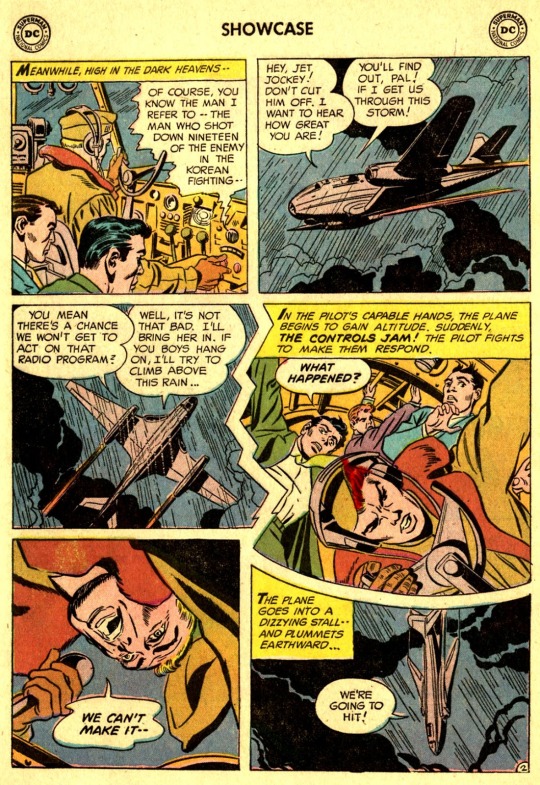
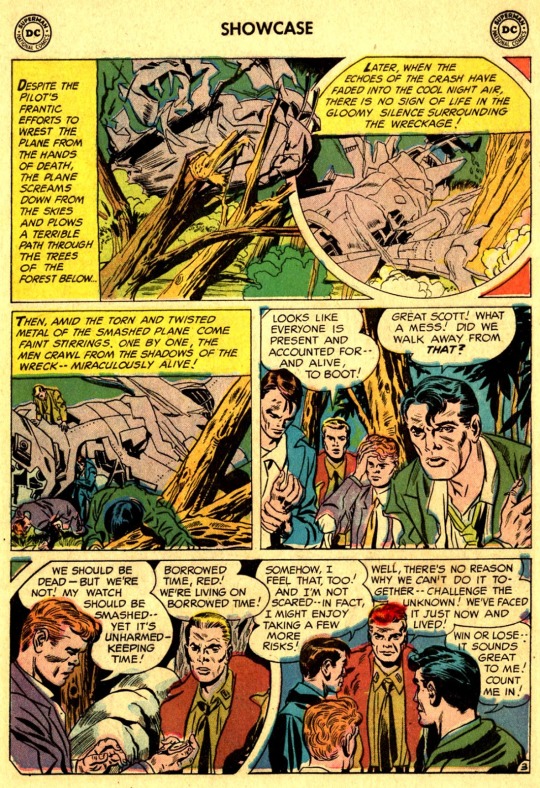
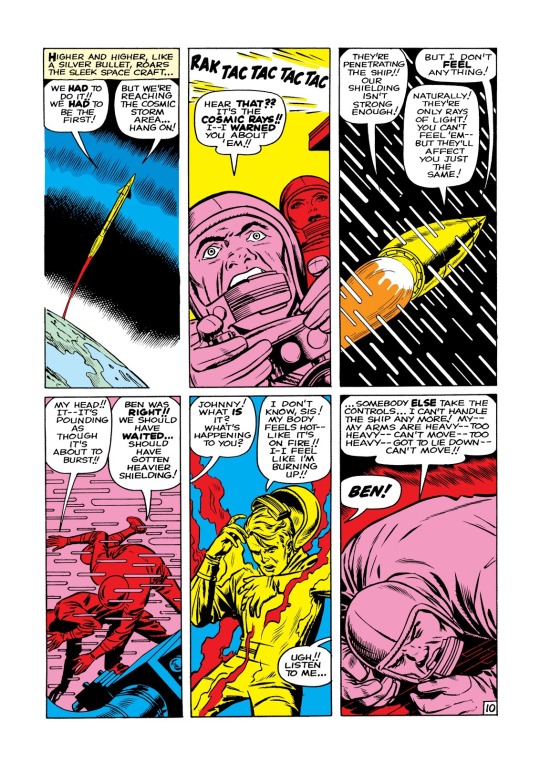
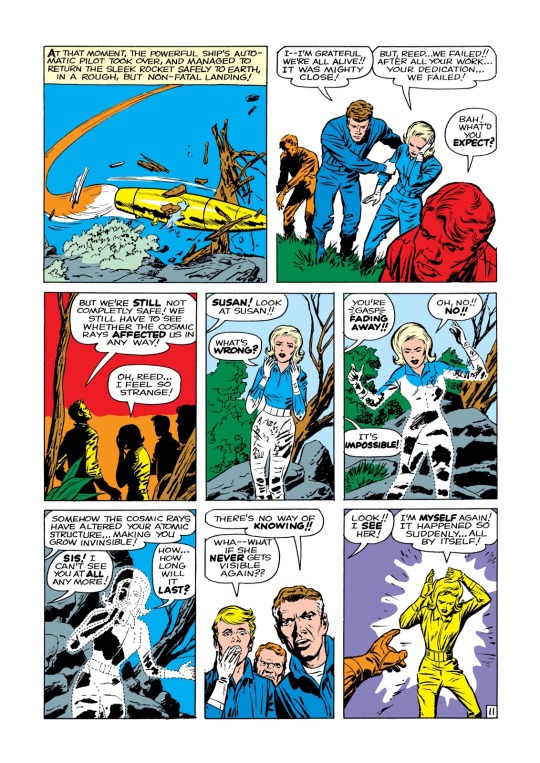
*Spider-Man is a Jack Kirby concept that originated between Joe Simon and C.C. Beck named "Silver Spider." Ditko has commonly stated that it bared too much similarity to The Fly, a character Kirby previously worked on at Archie, hence the change of hands on the project to Ditko. So far the presentation page and six page story Kirby did have been hidden by Marvel, with this Ditko drawing being our closest approximate:

**Kirby is credited in X-Men (2000) under "The Producers wish to thank the following for their assistance:"
210 notes
·
View notes
Note
I literally had not heard the term until your post, but I will say that it's unfair to shoot it down. I mean obviously it's inspired by sapphic directly, but the fight to get historians to admit Achilles was openly gay has been going on for hundreds of years at this point.
I will also concede that it doesn't sound nearly as good as sapphic. There's got to be an aspect of jealousy to it Lmao
i mean the thing with achilles is that he was not a fucking good person LMAO like song of achilles did irreparable damage to how people view his character like. yes historians often downplay his relationship with patroclus but Why would you want the misogynistic rapist to represent men's love for men? its also different because sappho's legacy is defined by her love of women and achilles' legacy is defined by his god-like abilities and hubris. and more to the point, the obsession with greek mythos as being a "gay" thing is just white people shit lol if you want an equalizing term to describe men's love for men whats wrong with gay? the reasons lesbians had for creating our own flag is because we are marginalized in our own community for being women* men online created their own flag and terminology bc??? they wanted to have their own thing too?? like the rainbow flag already was made by a gay man and has meaning like its just tew damn much 😭
#asks#not being antagonistic at awll if this is the first time youve heard of it then you havent seen what ive seen#this is not something i care hardcore about like i cant stop people from doing this but i will be annoyed at it
59 notes
·
View notes
Text
Worldbuilding Tidbits: Ranks
Most of these ranks are canon but I figured I ought explain some of them
Leader- Same as canon
Deputy- Same as canon
Druid- Renamed medicine cats
Lore-keepers- These guys are the historians, storytellers, lawmen, recordkeepers, diplomats, and morale boosters of the clans. Lore-keepers are very educated in history, legends and mythos, the warrior code, and diplomacy. They also keep extensive records of important events in the clan and older lorekeepers often help counsel the leader. Of course a single lorekeeper can't be good at everything, so usually a lorekeeper will specialize in one or two of the above fields. They don't fight and rarely hunt, and hurting or, Stars forbid, killing a lorekeeper or druid is one of the heaviest offenses in the clans
Warriors- Same as canon
Caretakers- The camp bodies, they keep the camp clean, repair/build dens, regulate which areas of the territory are to be hunted on, and offer emotional support for their clan. They can also hunt and fight, and are trained to protect their camp with their lives
Apprentices- Same as canon
Perma-queens- Mollies (or in rarer cases, toms and moggies) who stay in the nursery to help the queens and kits. They help raise the kits and offer support and comfort to their parents, and kitsit if their dam needs to take a break. So pretty much Daisy and Ferncloud
Fun fact, this rank is the most accurate to IRL feral cat colonies since they're made up of mostly mollies
Queens- Same as canon
Kits- Same as canon
Elders- Same as canon, but they are much more revered and the whole clan pitches in the care for them
---
Scavengers- A ShadowClan specific rank, they venture into the town to gather supplies and food and maybe recruit some new cats. They're very skilled in diplomacy
32 notes
·
View notes
Text
My @dreamlingforukraine fic for @ferelden-loser is finally done!
The prompt idea originally came from @softest-punk (post): ”Delirium and Hob meet in an opium den post-breakup w/Dream and Delirium decides to keep Hob warm for her favourite brother while he's sulking.”
But the historian side of me also wanted to go on a massive detour to debunk some of the mythos surrounding Victorian opium smoking, and things escalated from there.
Also, I thought it was about time that Delirium got to show her eldritch flower form!
#dreamlingforukraine#dreamling for ukraine#delirium of the endless#hob gadling#delirium of the endless & Hob Gadling#dreamling#dream of the endless#my dreamling writing
21 notes
·
View notes
Text
Aliens learning of Eldritch Horrors: Lovecraft Mythos
I’m a huge fan of H.P. Lovecraft horror. I know most of the big stories and smaller ones. Cthulhu is horrifying, but honestly there are worse. The big man is one of the saner entities out there.
So I recently pulled down a Lovecraft story book from my shelf and was going back through the stories, and it made me think: how would aliens react to hearing these stories? The idea that reality is simply the dream of one ancient forgotten god, including the lesser gods. I mean, if you actually read them there is some wacky shot in there. A mythos centered around the mysteriousness of the unknown, and a true hell hidden behind blissful ignorance.
Then I thought, “what if aliens discovered these things and had their own mythos?” What if every species has stories like these, but humans have the largest collection of them all? Perhaps aliens know that these things are true, but keep their distance. Then they discover humans and their extensive experiences with these ancient evils. Then aliens do something stupid and humans reveal big secrets yayyyy. Now I’m just spitballing.
Written from the perspective of an alien historian charged with cataloging traces of the Lovecraftian mythos.
WARNING: Depictions of violence, blood, and suicide.
~~~~~~
The tales were old as time. Older than the most ancient of civilizations within the cosmos. Some evidence could always be found within every culture. Whether an art piece, an artifact, or an oral story. But all knew how to deal with such things: leave it be.
As alien races began to connect and introduce their cultures, it became apparent there was more out there than we ever imagined. But we also knew better. We catalogued the tales, the artifacts, every scrap of evidence of these ancient beings, and then we ignored them. If any of the stories were true, we needed to heed the warnings.
But we were not prepared for the Terran race. Humans. A strange alien race from a death world long thought to be uninhabitable. Now found to be beautiful. While smaller and weaker than most races, they make up for it in their cunning and wild attitudes towards the universe. Many races fear their eagerness and unimaginably huge ego, while others welcome it. Such races usually burn out quickly without interference from others. But Humans were… different. They knew how to survive, even their own kind. When we added their knowledges to our libraries, many thought it would be the data we needed to spread into the cosmos.
How wrong we were.
It was an acolyte in charge of sorting through the new data that found it all. The stories. The mass knowledge of the unknown. More than that, they were first hand experiences of the ancient evils thought to be mere myth. Yet here it was. More accumulated knowledge than every race combined.
Granted, the stories told no more about these things than others did. The difference was the accuracy. How the Humans chose to write down every piece of literature and oral history they could remember. It was remarkable. For many a klick then we sat scrounging through these tales, rewriting and translating the words.
The more we read, the more we realized what all this may mean. The Human stories dictated these ancient creatures living on their world, Terra, aka Earth. Countless inscriptions of encounters with unknown beasts and horrors. Yet when asked about such things, the Terrans only shrugged. They said that those stories had long been dismissed as ravings of the old. If such things existed, they would have found them.
It was shocking to find the young race so ignorant of these things, even though we were guilty of the same crime. But we placated ourselves, claimed we only had bits and pieces whereas the Humans had an entire network of evidence. But the Terrans did not care. These were bed time stories to them.
We dove deeper and found that while most Humans dismissed the evidence, there were many who still believed. We were warned against finding those that held more evidence and knowledge, even ancient practices of this lost culture. The humans that believed such things had created communities of wild religious belief, cults that were not afraid to defy human societal law. They were labeled extremely dangerous.
But we dove. We leaped. And we didn’t even look underneath us. We became guilty of doing the one thing Humans were known for without realizing that we were not human. We did not have their instincts nor their rationalization and wild zeal. Their immortal adventurous youth.
We did what we were warned against. We sought out a cult. These humans welcomed us, celebrated with us, danced wildly. They spoke even stranger. They seemed to think we had come not to document their history and knowledge, but to welcome the “old ones” as well. We soon realized we had “jumped from the frying pan and into the fire” as humans would put it. We walked into a deeper hell.
We were shown histories, stories, artifacts, more evidence than a historian could dream of. It was a zircasian mine, to put it plainly. The humans did not defend or act cautiously as we expected. They rejoiced. When asked why, they relented that other humans were skeptics “destined for the black pits” but that they knew we understood. They expected us to help them in some way.
It was horrifying. It was hell. It was worse than any religion could damn their evil to. The humans had tricked us. They took my colleagues, split them open and bled them dry. They committed such horrible acts upon the many colors of blood I dare not write them for others to read. The worse came after.
It was indescribable. I can only depict what I understood. The humans danced and writhed in my colleagues blood as I and Yina’sa watched. They kept us alive to “bear witness to the return.” It was as if the fabric of space was torn, contorted, ripped apart to reveal the hidden void. Black tentacles and appendages slithered out, mouths full of teeth and fangs on the skin. But the worst was the eyes. The eyes of these ancient beasts. They were eyes of all races, yet not. They glowed and swirled, power emanating like a beating heart drumming in my ears. The humans still danced and chanted, screeching with sick delight. The chanting became “unearthly”, deep and strange. As if the humans were no longer just the ones chanting.
That was when I closed my eyes. I tried to block out the sounds, tried to pretend I was anywhere but there. I heard Yina’sa screaming, then laughing her Urulian laugh. She was screeching and cackling just as the humans were, shouting hideous things in her native tongue. I just wanted it to be over, over over Over OVER OVER OVER OV-
Then gunshots. True screams. Then a cosmic screech. As if the universe was crying out in pain. The ground shook. But I kept my eyes shut. The chanting was still repeating in my ears, I could t make it stop.
I barely remembered what happened afterwards. I had to be informed by my rescuers, a team of human soldiers. They had caught wind of our escapade, and had tried to reach us before it was too late. But alas. They had dragged me from that cavern, the only survivor.
I found out that Yina’sa had struck her head against the floor until her skull split open. To find out I was the only survivor among my group was…not ideal.
The humans informed me that they cult we had contacted was one that had been under surveillance for years, suspected of extreme violence and illegal obscenities. The human governments tried to warn us against contact knowing these humans we violent and dangerous. They knew these stories were not false. They had tried to dissuade us for our safety.
But we ignored them. Now blood is spilled, and I shall never forget those blood curdling screams, nor the chant the still beats in my head.
Nah’ka thm da
Nah’ka thm da
Nah’ka thm da
~~~~~~
Wow I kinda went off the rails. Wanted to write about aliens discovering humans having eldritch evidence, then trying to keep humans from finding the eldritch beasts. But then it turned into alien hubris and humans keeping the aliens away from the shit. Surprisingly this was kinda tame compared to my other posts. And for those wondering, I have more Humans are feral stories lined up, don’t worry about it.
Hope you all enjoyed. I wrote this feverishly at 10am, so I apologize for grammar and spelling mistakes.
Let me know if you have other suggestions for stories, and if you want me Lovecraftian stuff. Love writing about eldritch monsters.
#humans are crazy#humans are deathworlders#humans are fucking feral if you fuck with a cat#humans are insane#humans are space australians#humans are space orcs#humans are terrifying#humans are weird#lovecraft#eldritch#Lovecraftian mythos#h p lovecraft#eldritch monster#eldritch monsters
829 notes
·
View notes
Note
this is probably a very dumb question so im sorry in advance: but for praying to the Gods, is making khernip & the barley stuff absolutely necessary? is it vital? istg ill do more research but right now im just very confused haha
Here's the interesting thing: khernips and its use in modern Hellenic Polytheism isn't entirely "correct" (I don't like using this term in this context but I cannot for the life of me think of a better term atm).
Fel the Blithe explains this very well in their Purification & Cleanliness video, but I'll give the general gist here.
Khernips/lustral water was indeed a thing, just not how we view it. We tend to think of it as either burning something and extinguishing it in clean water while saying a prayer, or alternatively gathering sea water or making salt ("sea") water by adding salt to clean water. But the reality is that historians and archaeologists can't come to an agreement due to insufficient evidence as to what this water was for absolute certainty.
One source talks about khernips as we know it but even then the passage itself is iffy. Greek Religion by Walter Burkhert is viewed as a generally good source by most in the helpol community. I haven't fully read it yet so I cannot give my own opinion on it. But, here is what he had to say about lustral water:
"There is no consecration of the water, but often it must be drawn from a particular source... Occasionally, the water must be fetched from further afield, from an ever-flowing spring or from the always powerful sea... The purifying power of fire is joined to the power of water when a log is taken from the altar fire dipped in water and used to sprinkle the sanctuary, altar and participants."
Is this universal? Is this just from one city or temple? Was this the norm or only for a specific ritual or festival? Who knows!
So, what does this mean today? This doesn't negate khernips as we know it as invalid. After all, it is technically historical. However, we can't say for certain that it was the common person's method of cleansing before prayer, ritual, offering, etc. all across Ancient Greece.
Another method of cleansing one's self via water is spring water or water from a flowing river. In Ancient Greece, it was expected of one to cleanse, pray, and give an offering to the god presiding over the river that the person is about to cross. And they cleansed themselves with the water from the river.
Keep in mind that times were different. The concept of clean water was very different to us now. In today's time, clean water is a given and typically easily accessible (there are, of course, exceptions, but in comparison to hundreds of years ago, it's safe to make this general statement).
All of this to say, taking a shower, washing your hands in tap water, or splashing your face with it can be and is just as cleansing as khernips/lustral water because technically it is lustral water. If we're defining lustral water as clean water, then yeah, tap water from the sink or filtered water from a water dispenser is absolutely lustral and therefore spiritually cleansing!
But as for its use, cleansing yourself is typically a requirement before approaching the gods. Of course, there are exceptions, both modern and historical. There are plenty of mythos that show someone in desperate times praying without doing the proper ritual of the time (cleansing, offering, etc.). But overall, it is considered vital to be clean before the gods.
However, I don't really know what you're referring to when you say "barley stuff". Are you talking about Zeos Ktesios and the corresponding vase/container?
TLDR: "is making khernips absolutely neccessary?" is kind of two questions: is khernips itself necessary and is making a cleansing water to cleanse with before approaching the gods necessary. No to the first, yes to the second. But "making" a cleansing water is as easy as collecting tap water or filtered water. Whenever I'm about to approach the gods, I cleanse my hands with water (just water usually) before putting some of the water on my face as well. Hope this helped, anon!
#ask#anon#helpol#hellenic polytheism#hellenic polytheist#hellenic paganism#pagan#paganblr#witch#witchcraft#magic#witchblr#khernips#lustral water
55 notes
·
View notes
Text
Introduction: The King in Yellow
(A variation of the creation of Robert W. Chambers, from my WIP Through the Yellow Window)

Where to start with this guy
There's been as many interpretations of the King in Yellow (aka Hastur) as there have been people using the character. Not a creation of Lovecraft, he was inserted into the Cthulhu Mythos after the man's death... I'm not sure when but I think DnD is to blame.
I'm not a historian though.
People are probably most familiar with this guy thanks to the podcast Malevolent. My take on him is not like that.
Let me copy straight from my notes:
The King in Yellow just… is. He is a presence more than a body. Beneath his flowing, tattered robes, there is whatever he wills there to be. A human hand. Tentacles. Spider legs. His 'body' is a moving tear in reality. And he reaches through it. There is the feeling of enormity and throat drying horror in his presence (at least to [protagonist]). He breeds to spread his influence - little cracks in reality form in the presence of King spawn, growing deeper and deeper until he can seep through. He casts no shadow. They say he has a thousand Courts in a thousand worlds, and as many names in as many languages, all refractions of his might and malice. He seems to care not for the antics of the hive that surrounds him, and yet, he is always present in some form when they engage in the act of creation. A rippling curtain is his presence. A distorted whisper in the wind is his presence. A single insectoid hand emerging from the darkness is his presence. He does not need words or sound to speak.
He is a looming white masked figure, of yellow robes, of many tattered, empty sleeves swaying as he floats through existence. His spawn are often blonde regardless of human ancestry, and gifted in acting and public speech, and manipulation. His cult calls themselves the Royal Court, and he is adored by all those within it. The Duke of Carcosa is an especially favored cultist, while the Pawn is being punished for disloyalty.
He knows more about the protagonist of Yellow Window than anyone realizes, and even Azathoth could not dream of the plans he's crafting for his own amusement.
Psst - Follow for more posts like this! Through the Yellow Window will be published for free when it's released! Thank you again to @redacted-metallum and @actualblanketgremlin for letting me use their characters
@slenders1ckn3ss @jacquesfindswritingandadvice @redacted-metallum @actualblanketgremlin @higgs-space @phantomnations @mushabumi @assistantdirector--janson @aldhidbah @sabtael @yourheartonfireblog @jade-island-lives @arsenwormwood @cecuesta @darkhorse-javert @comicgoblinart @lizadomuch @minutiaewriter @angelsofprey @izzyspussy @passthebeat-blog-blog @dragonedged-if @andromedaexists @cyanide-latte @lillis-writes @suckerpunchfemale @late-to-the-fandom @eldritch-flower @cljordan-imperium @royal1asset-if @pineywitch @fragrant-stars @starry-voids @wubsbian @divine-anarchy @elbritch-kit @tousled-birdmad-girl @ajdoesthings @pen-for-sword @noightwitchers
#ms: character study sunday#writeblr#writeblr community#cthulhu mythos#lovecraft mythos#wip: yellow window#wip: psi#the king in yellow#king in yellow
44 notes
·
View notes
Text
exploring elder scrolls lore is a lot like playing historian and theologian. its interesting, complex, and contradictory in ways many media tries and fails to create realism. it is told primarily through unreliable narrators, in game texts that contradict each other as much as they agree, with varying opinions and perspectives you are tasks to sort through and come to your own conclusion on often enough. sure, skyrim drops the ball sending you on infinite annoying fetch quests and plots that feel like they dont even effect the world around you and killing a god has about the same weight as getting a cool sword, but there is still some meat behind the bland surface they couldn’t quite scrape out despite their best efforts.
the problem with it i find, like most fantasy stories and epic tales, is that is male focused.
“but brave” people cry “female characters do things all the time!” this is true, we do actually have more substantial female characters in the elder scrolls who are just as important as their male counterparts. sure their male counterparts are usually not important at all, but there is equality in there. and you can be bi presumably because bethesda couldnt figure out how to code any other sexuality in the game. but what i mean by “male focused” is that most of the lore and mythos we get concerns male heroes, battles, and war. there are politics sure, but mostly things like religion and battles. the importance of textiles is never considered, different cuisines are afterthoughts, fashion is relegated mostly to armor and cheap trinkets for you to enchant. if it does not exist to further grand tales of combat, is largely ignored, and this is increasingly more and more the norm in the elder scrolls.
it isnt entirely non-existent. if you go looking you can find bits and pieces. but most things presumed to be “women’s work” are largely ignored despite making up most of daily life. weaving isn’t a skill you can learn when historically we do see people wear armor made of linen, but you can sure mine and melt down metal, something also mundane and usually boring, because blacksmithing and mining are seen as a traditionally masculine jobs. so saying “ugh no one wants to spin thread” doesn’t exactly hold up when its equally as boring to make dozens of iron ingots and iron daggers to level up smithing.
it’s also just a shame because (and this is touched upon more in older games at least) what clothes people wear can tell a lot about their culture, background, and class. it could be used for stealth, for blending in, and if you are dressed incorrectly you look like and are treated like an outsider. how food varies region by region shows what food they have available to them, what they produce, what goods are more expensive, and also can talk about background and class. riften and solitude should not be eating largely the same food just with different mead. nor should they be mostly dressed the same. these things add richness and complexity to a world that is now largely ignored because who gives a shit just pick up a weapon and fight that’s all that really matters.
skyrim in lore has sheep. of course it does, because they live in a cold climate with a limited growing season, they have devote more time for crops to feed their people and not on textile crops like you might see in warmer climates with longer growing seasons. yet you dont see any sheep, just goats. you don’t see shepherds, or hear about them. you dont see piles of wool, or women spinning thread by the fire or weaving. you don’t see them dyeing yarn or fabric or sewing clothes. even if you don’t want to make your player do it as a game mechanic you could have it be present in the world as a logical part of the setting just as you have npcs working in fields. instead clothes just magically appear in chests and other loot cabinets and are relatively worthless except to enchant despite fabric being a very expensive, labor intensive product to make. it just pops into existence anonymously, largely unimportant and uninteresting. they always say very little, and mean nothing unless you want to play dress up or enchant for a spell caster.
it’s not like the designers have never had to think about these things before. they have, at least subconsciously. fabric is still very clearly heavy and wool. it contains classic pop culture “viking” imagery (including some that are uhhhh very not historically accurate like men wearing women’s broaches), but that’s about it. why they dress like this is unanswered. how their ancestors dressed isn’t really important. how they vary from location to location is also not important, because large swaths of land obvious wear and eat the exact same thing, that’s why there is no regional food or styles of dress across all of europe /sarcasm
anyways throw a dog a fucking bone every now and then i am tired of constantly looking for lore that isnt about fighting and killing and breaking shit. what did they wear and why, how did jewelry evolve, what dyes do they have accessible to them and how rare are they, fabric weaving, gossiping, give me it back so the world feels slightly more alive.
83 notes
·
View notes
Note
Does fanfiction bother you/ unnerve you? I know many artists consider fanfiction, especially of historical fiction, view it offensive and disown it. In a way, I think (based on my parasocial? relationship with ATG and investment in his and Hephaistion's relationship) would find it just an added web to his lore/ mythos? I can't ask him but I'd like to ask you (who I consider perhaps THE go-to historian for ATG).
I don't have a problem with fanfic.
I have a longer answer HERE, which explains why.
One thing I didn't address before is the opinion among some historians that ANY fiction (fanfic or professionally published) is problematic because it imposes a particular (probably untrue) elaboration about real human beings.
This is not an unfair concern, at least when it comes to living people, and why you can get in trouble for naming (non-public) individuals in print. There's a whole set of rules in publishing about what can and can't be said of living people (without facing a possible lawsuit). But I don't write about living people, so I'm sketchy on the details.
When it comes to people who have been dead so long they lack even (known) living descendants, I don't have an issue. I think it's crucial to mark fiction from history. That's one reason you'll see me, in some blog entries here, draw a line of separation between the historical people and my fictional characters. In fact, I've argued that writing fiction makes me a better historian--more aware of where the data ends and speculation begins, and even all-out fabrication, however rooted in fact. 😜
I AM, however, annoyed (not really offended) when historical fiction (whether fanfiction, but especially professionally published) is done BADLY. Practice the art of getting it right--or write something else. Especially if you're putting it out there for people to buy, for heaven's sake. I'm not paying for somebody's lazy research.
12 notes
·
View notes
Note
I've seen an uptick of hate for RR and his portrayal of the gods and accuracy to myth, do you have any thoughts on that with how much fic you write and the way you portray the gods? /gen
Hi! I’ve answered something similar to this HERE as well, if you’d rather read that! I haven’t seen any uptick of negativity, but I try to avoid any of the more discourse-y sides of fandom. Mostly because I’ve seen it all before, and while discourse is a valid way to interact with fandom, it’s not how I enjoy PJO!
Short answer: I don’t think a children’s book series is an educational source, nor do I think authors have a responsibility to be 100% accurate when it comes to writing fiction. If someone is looking to RR as their only source for mythological accuracy, that’s a different conversation to have.
Longer answer below the cut!
The books have flaws, and RR has flaws. But, I don’t expect a children’s fiction book to be perfectly accurate. Hell, classists still argue about a lot of the history and myth. New translations change how we think about Greek texts. There are different historical sources, authors and historians disagree with one another, etc.. History is complicated, especially when it’s so ancient! There’s a reason this is an area of study people devoted their lives to, after all.
I don’t see the PJO series as accurate, but I don’t think they need to be. At their core, I’ve always seen them as stories about Percy, and that’s a very human story that resonated with me as a child, and I know it resonated just as much with others. I likewise don’t read any other retellings expecting perfect accuracy (which, considering the subject, is difficult to do lol), but for a story I enjoy. I read Clytemnestra by Constanza Casati recently and it wasn’t perfectly accurate. But I enjoyed the story, I enjoyed the portrayal of a character who’s always interested me, and I enjoyed the author’s writing style. There are Greek (and other) retellings I didn't like for whatever reason, but that doesn’t mean it’s wrong per se, or that people can’t enjoy them as works of fiction.
When I first read the PJO books, I picked them up because I already loved Greek mythology, and I kept reading them for Percy. He was, and still is, a character I adore. That’s why I love PJO, even if as an adult I know they have a lot of flaws, know they’re often wildly inaccurate, and don’t agree with some of RR’s portrayals or takes. I don’t need to! I fell in love with PJO for the characters. Not for a perfect historical and mythological summary, or for a portrayal of the gods I see as relevant to me and my views and beliefs. And, to be blunt, I don’t think that anyone should read PJO or any of the related books as if they’re accurate. They’re not, and they don’t need to be. They’re works of fiction made for children.
My issue with the so-called accuracy isn’t the books; it’s when people claim they should be (or are) perfectly accurate, or when people use them as an actual source. RR has his issues, but if people are genuinely using a kids series as their source for all things Greek Mythology... that’s on them. He’s a children’s author, and that’s where he’s strongest. There are bits I liked, and bits I side-eyed. But the books are meant to get kids reading and having fun. I, and many people in the fandom, simply am not the target audience. I’ve re-read them and have had issues with some things, but those are issues I as an adult have, and that’s okay! They’re not meant for me. They’re meant for kids.
I could also say the same thing (and do) about so many other retellings, and so many other books. Stephen Fry’s Mythos, Madeline Miller and her books, the multitude of girl-boss retellings, and more. I’ve DNF’d some retellings, refuse to read others, and have my issues with some aspects of them. But, I don’t think any of the above authors, or RR, are presenting their books as some perfect historical texts, and I don’t think anyone should read them like they are.
I write because I love to write, and am still in this fandom because I adore Percy as a character and love the escapism and enjoyment it brings me. If someone else gets their enjoyment over debating accuracy in the books, that’s likewise 100% valid. It’s just not for me.
29 notes
·
View notes
Text
The Morrigán
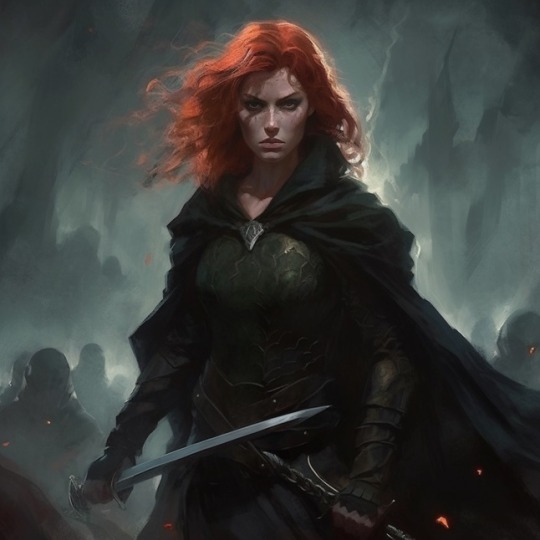
Name: The Morrigan (Great Queen, Phantom Queen,) Mor Rioghain, Morgain, Mórrígu, mór rígain, Morgan La Fay, The Bean-Nighe or The Washer At The Ford, The Wife of the Green Man, the Wyrd Sisters.
Symbols: Raven or Crow, spear.
Goddess of: Battle, prophecy, fertility, and sovereignty
Usual Image: A shapeshifter, she appears in many forms, a beautiful maiden, a mature woman, an ancient hag, a crow, a bear, and others.
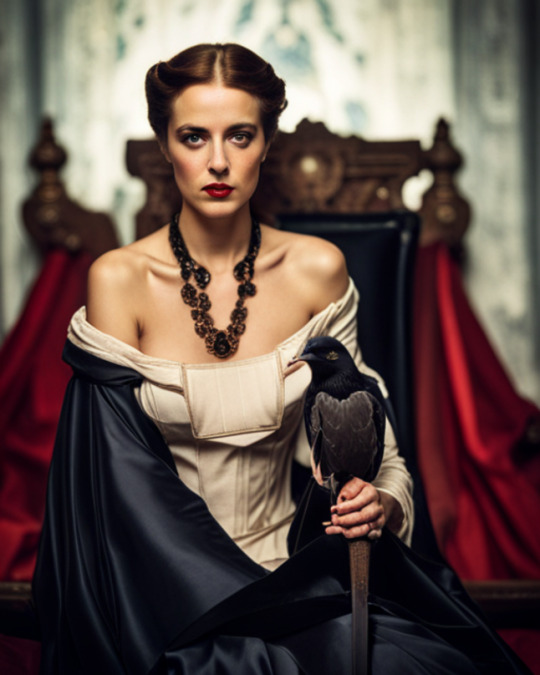
Relatives: Ernmas (mother) Cailitin, a Druid or Delbaeth or Dagda (father) Anu, Badb, Macha or Badb the Crow, Nemain the Venomous, Fea the Hateful. (Sisters or other aspects of her or goddesses she presided over.) Eriu, Fotla, and Banba (other sisters and goddesses of the land, not other aspects of her) Mechi (Son, father unknown) had three hearts, which were three serpents. The serpents, it was foretold, would destroy Ireland, so MacCecht killed him and burnt the hearts, throwing the ash into the river Berba; even then, the ash of his hearts boiled the waters of the river away and killed all the fish in the river.
Holy Books: Book of Leinster, Book of Fermoy
Synodeities: Kali (Hinduism,) Cathbodva (Gaul.)
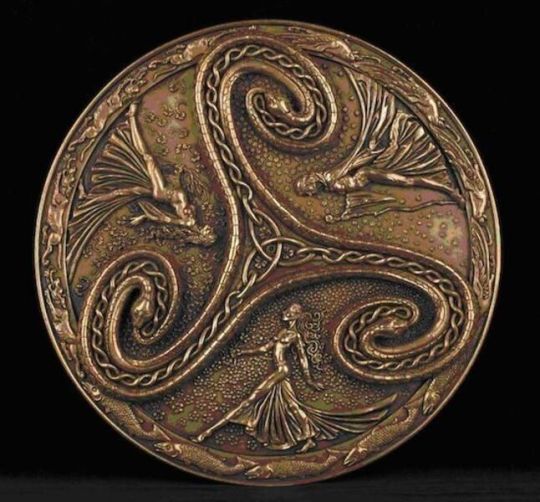
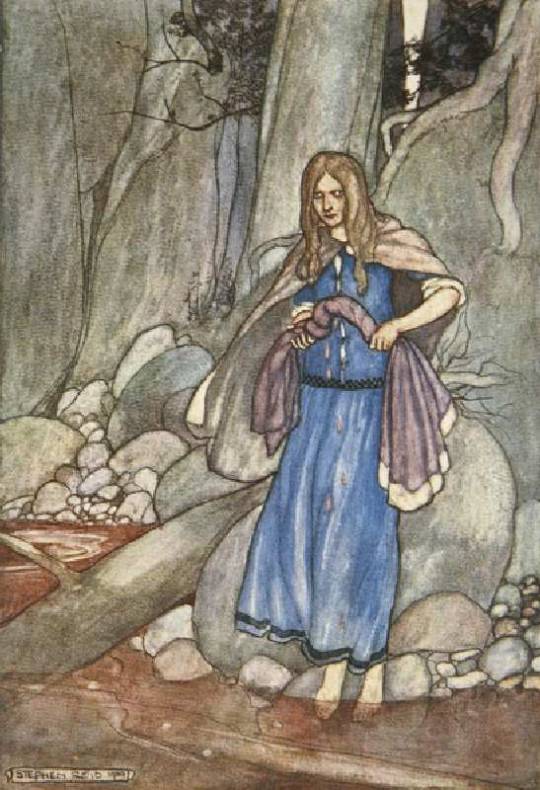
(The Watcher of the Ford, illustration from Cuchulain, The Hound of Ulster, by Eleanor Hull 1904)
Details: Once you look into the myths about the Irish goddess Morrigan you begin to understand why the Celts developed the Celtic knot!
At her most basic, Morrigan was a goddess of battle, who did not take part in the battle itself, but instead stirred up strife, then flew over the battle in the form of a crow who picked who would die by casting confusion on them, afterward feasting on their remains.
Not your warm and affectionate sort of goddess, yet she was also a goddess of fertility and sovereignty, without whom the king would be powerless.
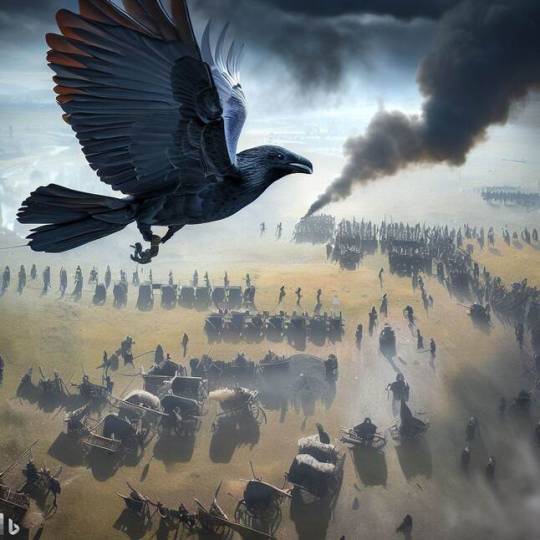
Going deeper into Morrigan (or The Morrigan as this may have at some time been a title) we find that she is also a triple goddess, who, along with either her sisters Badb and Macha or, in some accounts, Nemain the Venomous and Fea the Hateful, play a shifting role in scores of myths and legends.
What brings this goddess back in so many forms and guises, and age after age, returns in another form, even if this means mixing aspects that are both grand and horrific?
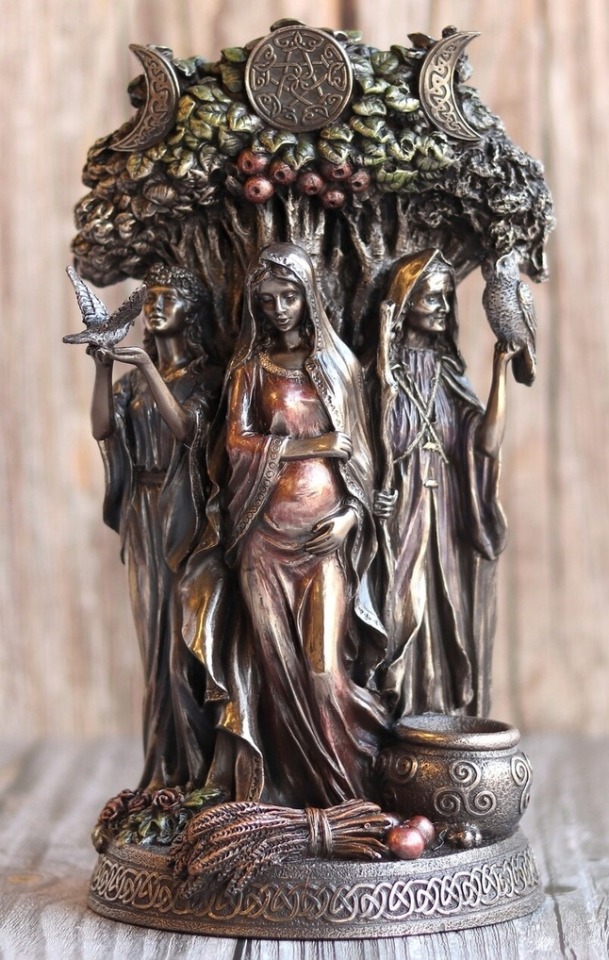
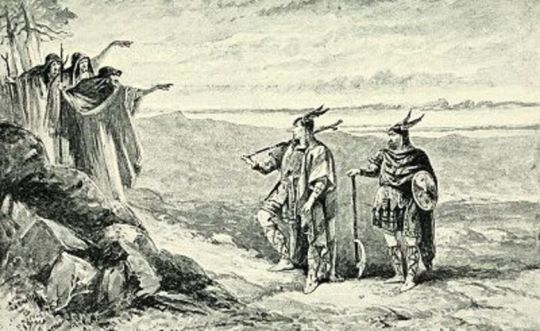
An answer might be found in the theory put forth by Ralph Abraham, mathematician, historian & Chaos theorist, in the book Chaos, Gaia, & Eros (1994, Harper Collins.)
To oversimplify it for this page, his theory is that three main forces have driven human consciousness through the ages, which he calls.
Gaia: The physical existence and living spirit of the created world.
Eros: The spiritual medium connecting Chaos & Gaia, the creative impulse and
Chaos: The creative void, the source of all forms.
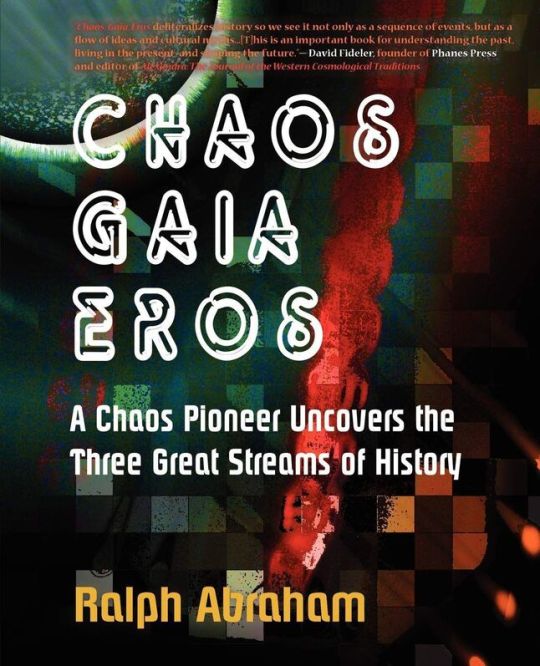
From the Paleolithic to the present, these three forces moved us forward, with at times one or more of them being suppressed only to resurface again and again.
Whoever the original goddess was who returned as the Morrigan, she was most likely first worshipped in a very different form sometime between 10,000 & 4,000 B.C.E. During what he called the Gaia span (agriculture/partnership.)
With the coming of the Eros span, 4,000 B.C.E. to +/- 1962 A.D. (the wheel, patriarchy & science), she was re-imagined by a new way of thinking that often feared Chaos and almost always had, as part of its dominant mythos, the conquest of Chaos by a hero or god representing Order.
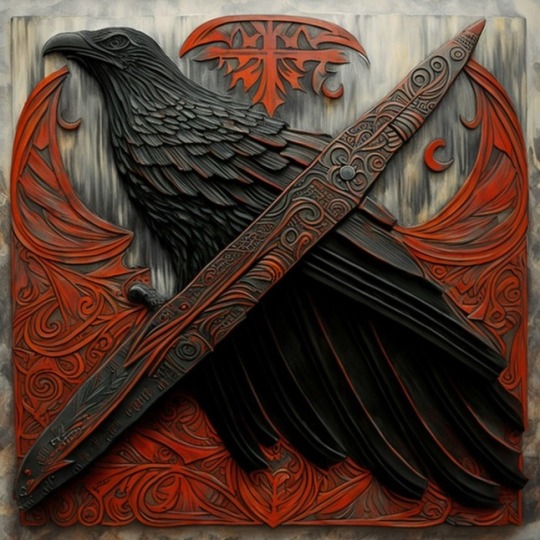
In this way, Morrigan changed from life-giver to carrion eater, and yet the three forces she is a part of continue to bring her back in multi-triad forms.
So that as the Eros span grew, she was not undone or put away but continued to shapeshift.
Changing from setting as a raven on the shoulder of dead Cú Chulainn to reappearing as Morgain La Fey in the tales of King Author, or as the wife of the Green Man and tempting Sir Gawain, to stirring the cauldron for Macbeth as the Wyrd sisters, and later as part of the Celtic Fairy faith, becoming the Bean-Nighe who is seen washing the bloody clothing of those who are about to die.
The thing is, in this theory, the Eros span has now begun to be overtaken by the now-developing Chaos span (Neo-Pagan, Post Modern, Chaos Theory, and meta-modern), which offers the hope of the end of the suppression of these three forces so they can be understood with positive effect.
No doubt the form that Morrigan takes in this era, if his theory is correct, will be most interesting indeed!

37 notes
·
View notes
Note
Why do you hate gay people, seriously, just when I start to associate Catholics in my head as "the cool Christians" a homophobic Catholic comes along and ruins the good image your brothers and sisters in faith were trying to build up. Like what did we even do to you? You can pursue your salvation and leave us to rot in hell without an unnecessary culture war, right?
I genuinely don't, and I'm not sure what post you're referring to, but I'm sorry that it gave the impression that I hate you or anyone else. I experience same sex attraction (although I don't talk about it much) and, although I do definitely get frustrated at time about disagreements, I'm sorry that I clearly portrayed myself as hating you or anybody.
That said, the whole point is that we don't want to let anyone just rot in hell. We want everyone to be saved. I cannot pursue salvation without trying to bring as many people as I can with me, and in my clumsiness, that sometimes re-wounds people in already really tender places. God wants to enter into the bruised and pierced and tramuatized and closed off places in our hearts and just sit with us, seeing us in truth and in complete love.
Christ is a Person, who truly existed. He was crucified and then His apostles had a sincere belief that they had seen Him raised from the dead, that they'd spoken with Him and touched Him. The overwhelming majority of historians (including non-Christians) affirm this to be true. His Apostles gave up everything to preach His message, being tortured and murdered rather than recant that they had encountered the Risen Lord. This isn't just a mythos we believe, it's history, and it belongs to you as your birthright.
God loves me, you, all of us, not in spite of our sins. He doesn't think, if only they could get over x, they'd be better and more deserving of love. He loves us now with a love beyond all comprehension. He wants us to come to Him and let Him see us. He wants us to be in right relationship with Him. He want us to turn away from what can never satisfy the achings in our hearts. This world is only a glimpse of what is to come, and it will never be enough when we were made for Communion with an eternal and infinitely loving God.
35 notes
·
View notes
Note
what did Ovid do? I took a myth class and he was the first author we read so I’m curious what the argument for him ruining Greek mythology is
okay so first and foremost a quick disclaimer that i am like. not a historian in the slightest. i’m just autistic and have had a special interest in greek mythos since like. fourth grade.
ovid is like. one of THE major poets of greco-roman mythology. his works are what inspired a lot of extremely influential writers that came after him (shakespeare, for example) so he’s a pretty big deal in the grand scheme of things. being roman, his works came much after the original greek writing he based them off of, so while most greek mythos got lost/destroyed, his survived. because of that, and his overall influence, a LOT of modern takes/views of greco-roman mythology comes from his interpretation of things. a good comparison i’ve seen to him is that there’s a larger gap in time between the lives of homer (author of the iliad and the odyssey, famous greek works; 8th century bc) and ovid (43 bc) and the lives of snorri sturluson (icelandic historian and compiler of norse mythology; 1179) and jack kirby (creator of marvel’s thor; 1917), and yet no one claims marvel’s thor to be an important figure in norse mythology.
additionally. ovid’s works were nothing but personal bias and hatred. ovid fucking HATED authority. he was anti-authoritarian to a T, and greek gods were authority. he went out of his way to write them as cruelly as possible because of that, as he used his writing to vent his frustrations against the government. he’s most infamously known for this bastardization of athena. trigger warning for rape in the upcoming paragraph.
in the original greek myth, medusa was always a monster. she was born a gorgon alongside her sisters, and died as one to perseus’ sword. in ovid’s retelling (a retelling that has become ALARMINGLY popular recently), medusa was born a human woman who was a priestess at one of athena’s temples. after medusa was raped within said temple, athena punished her, turning her into a monster that would turn any man who gazed into her eyes into stone.
he’s not a reliable source for basing your knowledge of greek myths on, and a lot of people DO because his ideas are so popularized and widespread that they’re seen as the originals. which sucks! he sucks! if i could kill him again i would!
#muse talk#trash-bin-ary#amazing url btw#but yeah. basically anyone into greek mythology hates his guts#bc he basically just wrote fanfic#which fine! he can do that!#but that’s become widespread as the canonical original texts#and they’re just. so not.#fuck ovid all my homies hate ovid
30 notes
·
View notes